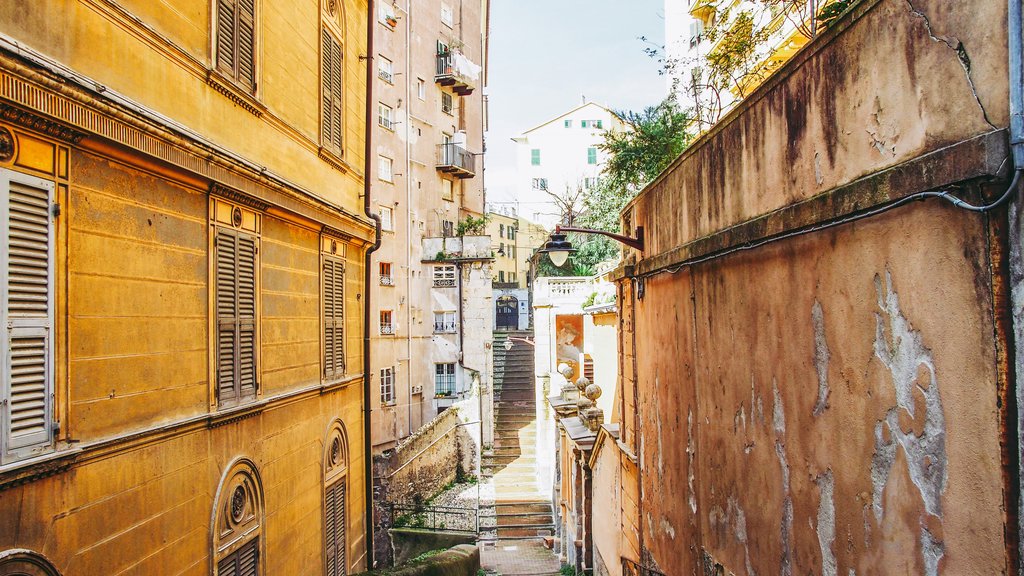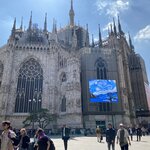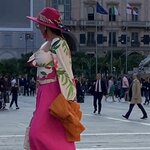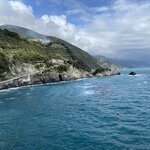Highlights
- Make—and eat!—a typical Italian pasta dish the traditional way
- Hike between Cinque Terre villages on a stunning coastal path
- Climb Pisa’s famed leaning tower
- Sunbathe on rocky beaches and soak in the relaxed vibe
- Stay in Portofino, a welcoming old-world fishing village
Brief Itinerary
| Day | Highlights | Overnight |
|---|---|---|
| Day 1 | Arrive in Pisa, Travel to Cinque Terre & Evening Cruise | Manarola |
| Day 2 | Wine Tasting & Villages of the Cinque Terre | Manarola |
| Day 3 | Cinque Terre Cooking Class at a Cesarina's Home | Manarola |
| Day 4 | Free Day in Cinque Terre | Manarola |
| Day 5 | Cinque Terre to Portofino, Sunset Kayak & Wine Tasting | Portofino |
| Day 6 | Portofino Boat Tour | Portofino |
| Day 7 | Day Trip to Genoa, Walking Tour | Portofino |
| Day 8 | Portofino to Pisa, City Tour & the Leaning Tower | Pisa |
| Day 9 | Free Day in Pisa or Tuscany Excursion | Pisa |
| Day 10 | Goodbye Italy! |
Detailed Itinerary
Day 1: Arrive in Pisa, Travel to Cinque Terre & Evening Cruise

Welcome to Italy! Arrive at Pisa International Airport, then transfer to your hotel in one of the villages of Cinque Terre.
Cinque Terre is a rugged strip of the Liguria coastline made up of five old fishing villages—Monterosso al Mare, Vernazza, Corniglia, Manarola, and Riomaggiore. The coast, villages, and surrounding hillsides are all part of the Cinque Terre National Park and UNESCO World Heritage Site.
The region is renowned for its beautiful nature and the abundance of Mediterranean plants covering the scrubby hillsides that tumble down to the turquoise water. The historic villages and breathtaking beauty of the region make it a popular choice for travelers. The historic towns prohibit vehicles, preserving the traditional charm, so most travelers arrive by train that runs along the coast or tour boat.
The area's coastline hiking trails are some of the world's best, linking the small villages together on a beautiful footpath. The path from Riomaggiore to Manarola is called the Via Dell'Amore (Italian for Lover's Walk). Its midpoint—The Lover's Lock, a statue of two people kissing—is a favorite place for couples to copy the gesture for a photo. Bring a small lock to attach to one of the gates or rails on the way to seal your eternal love.
In the evening, after you settle into your accommodation, head out onto the water to enjoy a small group sunset boat tour. Sit back and admire the views of the charming Cinque Terre fishing villages on a 2-hour route from Manarola. You'll pass by ancient fortresses guarding the tops of communities, terraced vineyards cascading down to the water, and scenic ports welcoming fishing and tour boats home.
Go for a dip in the water off the deck of the boat and toast your first night on the Cinque Terre coast, then enjoy delicious local food and snacks as you watch the sunset.
Day 2: Wine Tasting & Villages of the Cinque Terre

Spend the day discovering the rugged nature and charming villages of the Cinque Terre.
Start the day with a guided hike up to a Riomaggiore vineyard where your expert guide will explain the region's tradition of wine-making, which centers around each family owning a small piece of terraced vineyard on the cliffs above the village. The family lots, which pass down from generation to generation, have been terraced and cultivated in the same way for centuries. The locals take a lot of pride in growing their own family wine and taking care of the delicate grapevines the same way their ancestors did.
The town and vineyard both enjoy sweeping views over the coastline and surrounding hills. Learn about this region’s traditional wine-making methods and centuries-old techniques as you walk through the rows of grapes. The focus here is on making high-quality wine without using any chemical products, and the results are the pride of the Cinque Terre Region.
Enjoy a vineyard tour, then sample two local wines to experience the delicate fruit flavors for yourself and see how organic wine-making makes a difference in flavor. Nibble on traditional Ligurian focaccia bread as you learn more about the production of the wines and take in the views from the vineyard.
After the three-hour tour, head back to town to find a family-owned cafe for lunch, then spend the rest of the afternoon exploring the Cinque Terre villages. The five historic villages of the Cinque Terre are connected with a network of boat and train lines that ferry locals and travelers from town to town.
The train arrives hourly at each town, so it's easy to hop over to the next town. Keep in mind that the train stations are located above the towns and require a walk uphill through the steep town streets to reach the station. There will be plenty of time in each village to learn about its past, explore narrow streets, and buy gifts before returning to Manarola for the evening.
Day 3: Cinque Terre Cooking Class at a Cesarina's Home

Today you'll discover the secrets behind traditional Italian cooking with a private 6-hour cooking class. Pick from a morning or afternoon start time, then head to the local market to browse fresh local produce. Your instructor will help you pick the freshest and best ingredients for your dishes.
Select your ingredients, then make your way to the Cesarina's home. The Cesarinas are enthusiastic home chefs who love welcoming travelers into their homes to teach them the secrets of traditional Italian cooking.
You'll spend your time learning to make three different dishes, from the preparation all the way to the presentation. Start with Focaccia, the delicious Ligurian bread that's typically baked with olive oil, herbs, and occasionally olives or other delicious toppings. It's amazing on its own or dipped in sauce, and fresh-baked focaccia from the neighborhood bakery is a favorite with locals.
Next, make Ravioli, a stuffed pasta that was allegedly invented in Liguria, in the town of Novi Ligure. No one knows how true this is, but ravioli was a popular meal to serve sailors aboard ships. Everything left at the end of a meal was chopped and mixed, then stuffed into envelopes of pasta for a convenient meal the next day. No leftovers today, though—you'll make your ravioli with fresh ingredients and handmade pasta dough.
Your final step will be preparing Pesto alla Genovese, make with the coast's famous basil. While Italy is the home of many different pestos ("pesto" refers to any paste of herbs that's ground with mortar and pestle), the Pesto alla Genovese carries a D.O.P. protection. This means that it can only be made in a precise way, with very specific ingredients, to be considered the real thing. The ingredients are simple—basil, pine nuts, Parmigiano-Reggiano, Pecorino, garlic, salt, and olive oil—but the result is mouth-wateringly delicious.
Once you're finished, sit down to enjoy your meal with the perfect glass of wine from the local cellar.
Day 4: Free Day in Cinque Terre

Today is a free day to explore the area. Select from the following suggestions, then head out to make the most of your time on the sunny coast:
- Soak in the sunshine, sunbathe on the rocks, or dive off the cliffs into the turquoise water at one of the Cinque Terre's many beaches. The sandy Monterosso Beach has both public and private sections. The Vernazza Beach is rocky and perfect for sunbathing, and the Levanto Beach is unusually long, which is rare for the area.
- Visit the 17th-century Chuch of San Francesco to see fine art, including a depiction of the Crucifixion by Antoon Van Dyck and other notable Italian painters of the 17th- and 18th- centuries.
- Tour the 1,000-year-old Castello Doria in Vernazza, the Cinque Terre's oldest surviving structure, for sweeping views of the town and harbor
- Climb the Scalinata Lardarina, a steep 377-step staircase that connects the harbor with the village of Corniglia, for some of the Cinque Terre's best views
- Dive into the 14th century at the Chiesa di San Lorenzo, an immersive experience into the art and architecture of that time period
- The Cinque Terre has no shortage of churches—visit a few of them, including the Santuario di Nostra Signora di Montenero in Riomaggiore and the Church of San Giovanni Battista in Corniglia
- Explore the 13th-century Castello Di Riomaggiore, which dominates the Cinque Terre coastline. Built to protect the town from seafaring pirates, the castle is now simply a throwback to a different time, as well as a great place for photographs. Head inside the castle to see the museum exhibit of the centuries of town history
- Walk up to the Torre Aurora, a medieval castle that stands at the intersection of Monterosso's Old Town and New Town.
- Pay a visit to Cantina 5 Terre in Riomaggiore, the Cinque Terre's only major winery, to learn about how ancient traditions mix with modern-day production techniques to produce a unique and flavorful wine. Sample the wines, especially the local white, and enjoy a relaxing afternoon
Chat with a local specialist who can help organize your trip.
Day 5: Cinque Terre to Portofino, Sunset Kayak & Wine Tasting

After a delicious breakfast, walk to the town's train station, where you'll catch the hourly train to Portofino. Transfer to your accommodation and settle in.
Portofino is one of the Italian Riviera's many small fishing villages. The town, which crowds up to its historic small harbor, is renowned as one of the Mediterranean's most beautiful ports. One of the town's main sights is the Statue of Christ of the Abyss, which lies 56 ft (17 m) below the waves on the seafloor in memory of Dario Gonzatti, the first Italian to use diving gear. Other notable sights include the 16th-century Castello Brown, the 12th-century Church of St. Martin, and the gothic Oratory of Santa Maria Assunta.
However, the main attraction is the town itself, where colorfully painted houses tumble down to meet a fishing port. Narrow streets lined with shops, art galleries, cafes, and restaurants lead up from the water, and the beautiful beaches and tranquil town piazzas are full of families and couples enjoying the sunny weather.
In the afternoon, paddle your way around Portofino and watch the sunset along the Riviera on an evening kayaking excursion. Don't worry—all the appropriate instruction and equipment is provided, leaving you with nothing to do except enjoy the calm coastal waters and enjoy views of the shore. You'll pass landmarks such as the Portofino Lighthouse and the Church of San Giorgio, then head back to shore for a wine tasting with a view of Paraggi Bay.
Day 6: Portofino Boat Tour

After a leisurely breakfast, make your way to the harbor for a morning out on the water. Portofino is widely renowned as a jewel of the Italian Riviera coast, and the pretty harbor, clear waters, and spectacular scenery draw divers and beachgoers from around the world.
Explore all this and more on your private 3-hour boat tour with your guide at the helm. You'll stop to see the stunning San Fruttuoso Beach, which sits in the shadow of a medieval abbey, then go snorkeling around the submerged Christ of the Abyss statue.
The afternoon is free to explore on your own. Pick from the following suggestions to discover the area's beautiful nature.
- Go hiking in Aveto Natural Regional Park, an area well-known for its geologic history and variety of wildlife. You'll walk in rocky alpine landscapes, fields, and shaded woods as you explore the rural landscape.
- Visit the temperate Fontanabuona Valley to see the production of hazelnuts, chestnuts, and olive trees. The valley runs parallel to the coast and is protected by mountains from severe storms, making it the perfect growing environment. The valley's other main activity is the extraction of slate, known locally as "sleeping bread."
- Learn to make homemade pasta from scratch, starting with your own dough, and fresh market produce during a cooking class. You'll make (and eat!) delicious regional specialties, including fresh ground basil pesto and a Ligurian vegetable tart.
- Rent a paddleboard for a fun afternoon on the water as you explore the coast from a unique perspective
Day 7: Day Trip to Genoa, Walking Tour

In the morning, take the train to Genoa, about a 1.5-hour trip to the west along the coast.
Genoa is a seaport city and has a rich history of seafaring, global trade, and wealth. Its old town is nicknamed "La Superba" (the superb one) in memory of its glorious shipping history, and in 2006 it was named a UNESCO World Heritage Site. Two years prior, in 2004, the city of Genoa was named the EU Capital of Culture, paying homage to its incredible art and architecture.
The city is also renowned for its music, food, and ancient Medieval city center. The town's narrow labyrinthine streets and alleys, known as caruggi, are the perfect place to wander around for an afternoon.
Architecture and history buffs will love exploring the city's many churches, including the Romanesque 12th-century Church of San Donato, the Gothic 13th-century Church of Sant'Agostino, the small 15th-century Oratory of San Giacomo della Marina, and the beautiful Baroque 17th-century Basilica della Santissima Annunziata del Vastato.
Other notable sights include the Piazza De Ferrari (home of the Opera and the Palace of the Doges) and the Villetta Di Negro (named after Gian Carlo Di Negro, who founded a botany school on the site in 1802) and Villa Durazzo Pallavicini public parks.
In the afternoon, explore the city on a 3-hour guided walking tour. You'll stop to see the historic city center with its narrow alleyways, the Palazzi dei Rolli, the old harbor, and the ancient Roman Castrum—a fortified military site. You'll also tour the 11th-century Romanesque-Renaissance Cathedral, as well as the Via San Lorenzo—one of the town's main historic streets.
Another stop on the tour is the rive gauche, the oldest part of the city. Walk through the Porta Soprana, one of the two medieval 12-century gates left standing in the city. Just past this is the Romanesque Cloister of Sant'Andrea, and the building built on the foundations of the home is believed to be the birthplace of Christopher Columbus.
You'll have plenty of time to browse the shops and boutiques along the old town streets after the tour, then find the perfect little restaurant for a lovely dinner. Return to Portofino in the evening.
Day 8: Portofino to Pisa, City Tour & the Leaning Tower

In the morning, head to the Portofino train station, then take the train to Pisa. Transfer to your hotel and settle in.
The port city of Pisa sits on the right bank on the mouth of the River Arno and faces the Ligurian Sea. The city is most famous for the Leaning Tower of Pisa, which is the cathedral's lower bell tower. The city is also home to over 20 other historic churches, palaces, and museums that chronicle the city's history. The 12th-century University of Pisa houses the Orto Botanico, the world's oldest university botanic garden.
Pisa's main tourist attractions are grouped at the site known as the Campo dei Miracoli, Italian for the Field of Miracles. The leaning tower, Romanesque Cathedral, Museo del Duomo, Museo delle Sinopie, and large Baptistery all crowd together next to the Campo Santo—the Holy Field. This cemetery is said to have been laid with earth brought back from the Holy Land by the Crusaders.
Other notable churches include the 16th-century Church of Santo Stefano dei Cavalieri, the 11th-century Church of San Nicola (whose bell tower was allegedly designed by Diotisalvi, the architect behind the famous leaning tower), and the 13th-century Church of San Francesco.
The Piazza dei Cavalieri (Knights Square), home to the imposing Palazzo della Carovana whose impressive facade was designed by Giorgio Vasari, is also a must-see.
In the afternoon, head out to explore one of Italy's most iconic attractions. The 3-hour tour starts with a walk around Pisa's medieval walls, where you'll take in the extraordinary views of the Piazza dei Miracoli with its incredible white marble architecture and impeccably neat grass lawns.
Tour the Cathedral inside to see masterpieces of Romanesque art, then head to the echoing Baptistery and cemetery. The Baptistery is a marvel of engineering, and its tall dome roof allows sounds to echo for long enough to enable someone to sing a 3-part harmony with themselves.
From here, continue to see the famous leaning tower. Admire the exterior (and take pictures to show back home!) before heading inside to climb the steps to the top. From here, the views of the Cathedral, Baptistery, and surrounding cityscape are well-worth the climb.
Afterward, stop by the local gelateria for a cone of creamy gelato.
Day 9: Free Day in Pisa or Tuscany Excursion

Today is a free day to explore everything Pisa has to offer. Pick from the following list, then head out to explore:
- Dive into history at the Museo Nazionale, the city's most prized museum that features some stunning artifacts and sculptures
- Pay a visit to the Santa Maria della Spina Church, which, although small, is considered one of Pisa's most beautiful due to its ornate design and riverside location.
- Enjoy a cone of gelato or glass of expresso in a streetside cafe neat the Palazzo dei Cavalieri.
- Tour the Museo dell’ Opera del Duomo to see a whole host of delightful treasures (bonus - it's one of the least visited in Pisa, so you'll get plenty of time to enjoy everything!)
- Go shopping for high-end luxury items on the historic Borgo Stretto and enjoy beautiful architecture as you browse. The street starts at the Piazza Garibaldi next to the Ponte di Mezzo
- Explore the incredible Pisa Botanical Gardens, the world's oldest university botanical gardens
- Get a rush of adrenaline at the Adventure Park II Pineto, which features zip lines, swinging bridges, rope ladders, and more.
- Head to the medieval town of Lucca, famous for its intact Renaissance-era city walls, which now function as a pedestrian promenade and make for a pleasant walk around town. Lucca's long history goes back to Etruscan and Ancient Roman times, and the city retains many examples of ancient architecture. History buffs will love Lucca's Gothic architecture and churches.
- Take a day trip to the hilltop town of Siena, one of Italy's favorite destinations and a UNESCO World Heritage Site. Its art, museums, food, medieval architecture, and the Palio—a popular biannual horse race—make the town a must-see for visitors to the area.
- Enjoy a tour of the Chianti and San Gimignano wine region, which is world-famous for its rolling green hills, ancient vineyards, and sprawling countryside villas.
Day 10: Goodbye, Italy!

Time to say goodbye to the country of love! After one last cappuccino over breakfast, head to the airport for your connecting flight home. Safe travels!








